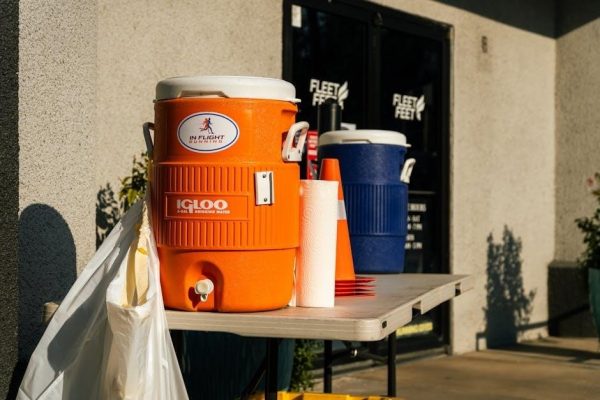Becoming a guide dog puppy raiser is a rewarding role that combines compassion with purpose․ While not a traditional salaried position, many organizations reimburse expenses, ensuring raisers can provide necessary care and training․ The emotional reward of nurturing a future guide dog often outweighs financial compensation, making it a fulfilling endeavor for animal lovers․
1․1 Overview of the Role and Its Importance
Guide dog puppy raisers play a vital role in preparing future service animals․ They provide care, socialization, and foundational training for puppies, shaping their skills for assisting individuals with disabilities․ This role is essential for developing confident, well-adjusted dogs capable of fulfilling their future duties․ Raisers dedicate 12-16 months to nurturing these puppies, ensuring they adapt to various environments and situations․ The work is both challenging and rewarding, knowing the profound impact these dogs will have on their eventual partners’ lives․ It’s a commitment that requires patience, dedication, and a love for animals․
1․2 Understanding the Compensation Structure
Guide dog puppy raisers are typically not salaried employees but rather volunteers or independent contributors․ Compensation often comes in the form of reimbursements for expenses such as veterinary care, supplies, and training materials․ Some organizations may offer stipends or hourly pay, but this varies widely․ The primary reward lies in the emotional fulfillment of contributing to a dog’s development․ Costs like food and toys may not always be covered, making it essential for raisers to have some financial flexibility․ This structure underscores the role’s altruistic nature․
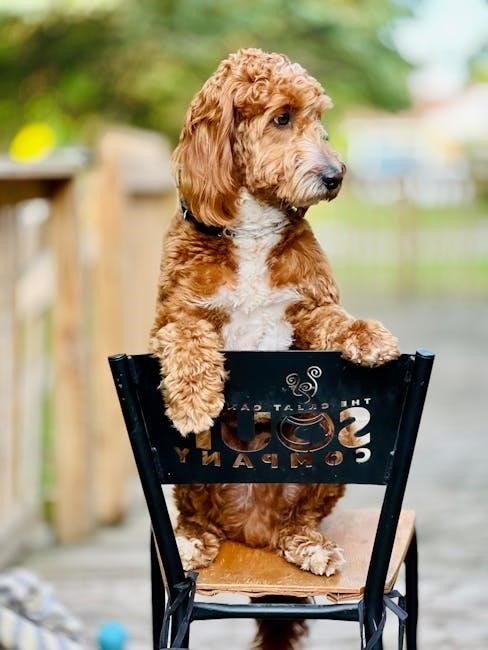
Average Salary of Guide Dog Puppy Raisers
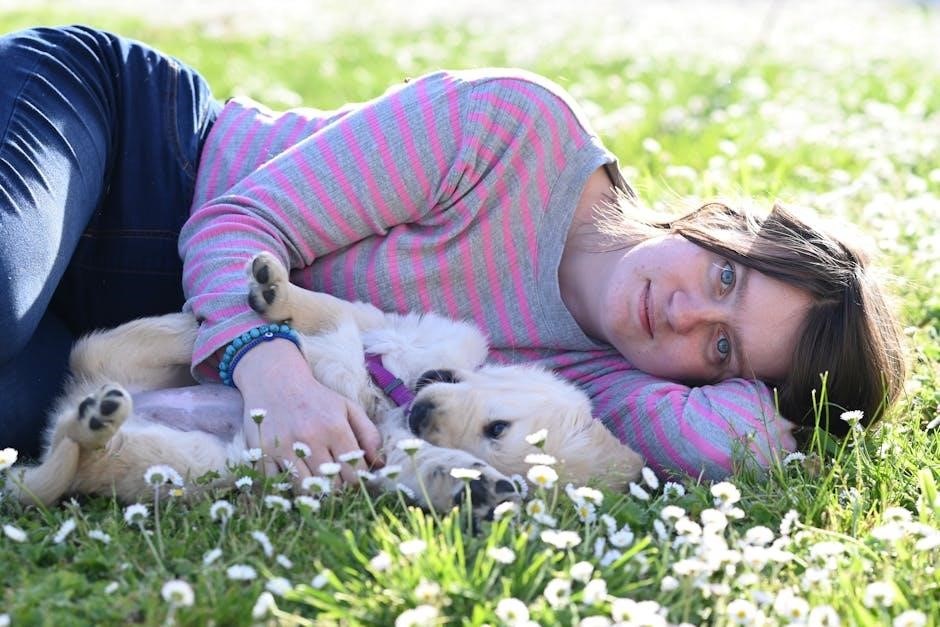
The average salary for guide dog puppy raisers in the U․S․ is approximately $28․34 per hour, translating to $58,937 annually․ This figure reflects the role’s specialized nature and demand․
2․1 National Average Salary in the United States
The national average salary for guide dog puppy raisers in the U․S․ is approximately $28․34 per hour, or $58,937 annually․ This figure reflects the role’s specialized demands and the critical contribution raisers make to the development of future service animals․ While the salary is competitive, it is important to note that many organizations also provide reimbursement for expenses related to puppy care, ensuring raisers can fulfill their responsibilities without financial strain․ This compensation structure underscores the value placed on their dedication and expertise․
2․2 Hourly vs․ Annual Salary Breakdown
Guide dog puppy raisers in the U․S․ earn an average of $28․34 per hour․ Over a full-time schedule, this translates to an annual salary of $58,937․ The hourly rate is calculated based on the time and effort required to care for and train a puppy, which can vary depending on the organization and the raiser’s level of involvement․ This breakdown highlights the financial investment organizations make to support raisers, ensuring they can provide the necessary resources for the puppies’ development without incurring significant personal costs․
Factors Influencing the Salary
Factors such as geographic location, cost of living, experience, and specific organizations significantly influence guide dog puppy raiser salaries, impacting reimbursement levels and overall compensation structures․
3․1 Geographic Location and Cost of Living
Geographic location significantly impacts guide dog puppy raiser salaries, as living costs vary across regions․ Urban areas with higher expenses may offer greater reimbursement rates to cover increased costs of food, veterinary care, and supplies․ Conversely, rural areas with lower living costs may result in slightly reduced financial support․ Organizations often adjust compensation packages based on local economic conditions to ensure raisers can adequately care for puppies without financial strain․ This ensures consistency in puppy care standards nationwide․
3․2 Experience and Duration of Service
Experience and duration of service significantly influence the compensation for guide dog puppy raisers․ Seasoned raisers, having honed their skills over time, often receive higher reimbursements due to their proven ability to successfully raise and train puppies․ Additionally, the length of time one has been involved in the program can lead to increased financial support, as organizations recognize the dedication and expertise that comes with extended service․ This ensures that experienced raisers are adequately compensated for their ongoing commitment to the program’s success․
3․3 Specific Organization or Program
The compensation for guide dog puppy raisers can vary significantly depending on the specific organization or program they are associated with․ Larger, well-funded organizations often provide more comprehensive financial support, including stipends or reimbursements for expenses like veterinary care and supplies․ Conversely, smaller or local programs may offer limited financial compensation, focusing instead on non-monetary benefits like training and community support․ The policies and resources of the organization play a crucial role in determining the level of financial assistance provided to puppy raisers․
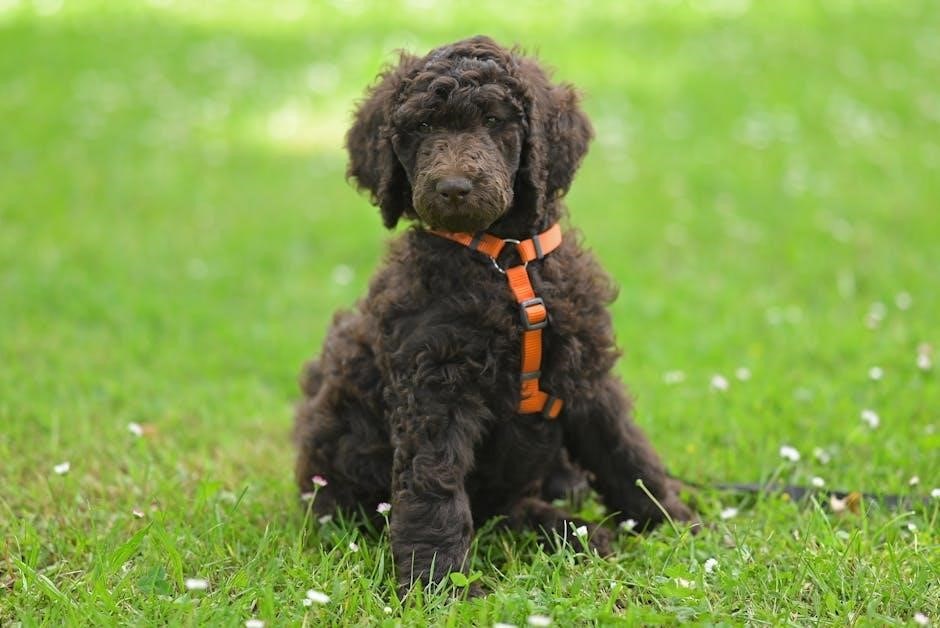
Benefits and Reimbursements
Guide dog puppy raisers often receive financial support for veterinary care, supplies, and training expenses․ Some organizations also provide stipends or reimbursements to offset costs, ensuring raisers can focus on nurturing future service dogs․
4․1 Veterinary Care and Supplies Coverage
Organizations typically cover essential veterinary care, including vaccinations, preventatives, and spay/neuter procedures․ Additionally, basic supplies like crates, vests, and toys are often provided․ However, expenses for food and routine grooming are usually the raiser’s responsibility․ This financial support ensures that puppy raisers can focus on the dog’s health and development without significant out-of-pocket costs, fostering a nurturing environment for future guide dogs․
4․2 Training and Support Provided
Most organizations offer comprehensive training and support for puppy raisers, ensuring they are well-equipped to care for future guide dogs․ This includes initial training sessions, ongoing workshops, and access to experienced coordinators․ Many programs also provide detailed manuals and resources to guide raisers through the process․ Additionally, regular check-ins and developmental assessments are conducted to monitor progress․ This structured support system enables raisers to confidently nurture and train the puppies, knowing they have access to expert guidance throughout the journey․
Responsibilities of a Guide Dog Puppy Raiser
Guide dog puppy raisers are responsible for providing daily care, socialization, and basic training to puppies․ This includes feeding, grooming, and ensuring proper health․ They also expose puppies to various environments and experiences to prepare them for future roles․ Raisers must adhere to organizational guidelines, monitor developmental milestones, and report any health concerns․ The commitment typically lasts 12-16 months, during which raisers play a crucial role in shaping the puppy’s behavior and skills, laying the foundation for their future as guide dogs․
5․1 Daily Care and Socialization
Guide dog puppy raisers handle daily care, including feeding, grooming, and health monitoring․ Socialization involves exposing puppies to diverse environments, like parks and public spaces, to ensure they adapt well․ This includes introducing them to various people, animals, and situations to build confidence and calmness․ Raisers also focus on basic obedience training, teaching good manners, and reinforcing positive behaviors․ These efforts prepare the puppies for advanced training and their future roles as guide dogs, emphasizing trust and reliability in all settings․
5․2 Training and Developmental Milestones
Guide dog puppy raisers focus on teaching basic commands and promoting developmental milestones․ Puppies typically stay with raisers for 12-16 months, during which they learn obedience, house manners, and adaptability․ Raisers ensure puppies are exposed to various environments to enhance confidence and calmness․ Training includes leash walking, crate etiquette, and responding to commands consistently․ Organizations often provide structured guidelines and resources to track progress․ The goal is to prepare puppies for advanced training, ensuring they meet the standards required to become reliable guide dogs for individuals with visual impairments․
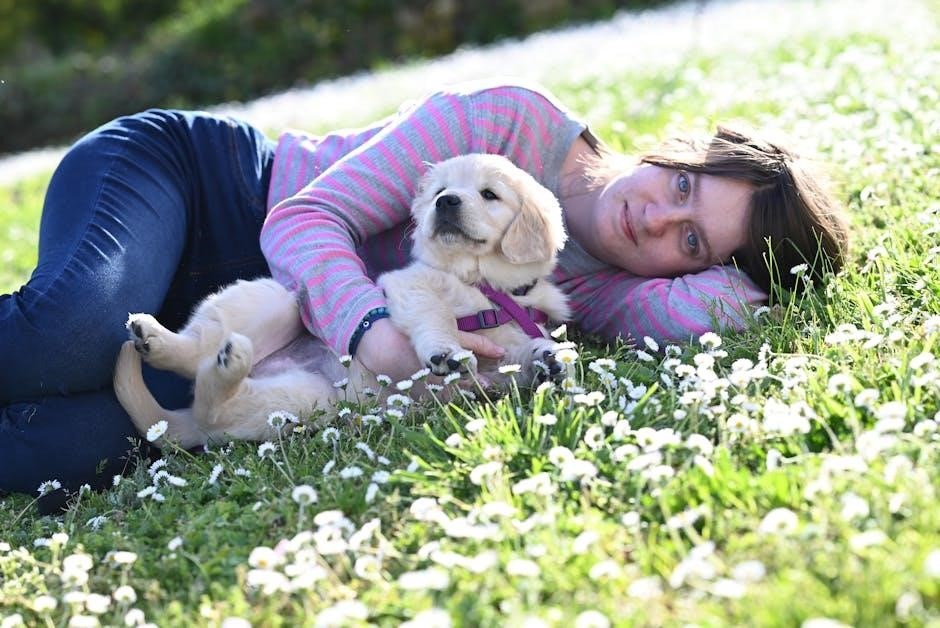
Qualifications and Requirements
Becoming a guide dog puppy raiser requires patience, consistency, and attention to detail․ Raisers must follow organization guidelines, work independently, and ensure puppies meet developmental milestones effectively․
6․1 Necessary Skills and Attributes
To excel as a guide dog puppy raiser, one must possess strong communication skills, patience, and consistency․ The ability to follow structured guidelines and work independently is essential․ Raisers should also demonstrate attention to detail to track a puppy’s progress and address any developmental needs․ A nurturing personality and commitment to providing a stable, loving environment are crucial․ Additionally, basic knowledge of dog behavior, adaptability, and reliability in maintaining regular training schedules are key attributes for success in this role․
6․2 Application and Screening Process
The application process for becoming a guide dog puppy raiser typically begins with a written application and a detailed questionnaire․ Candidates are then invited for an interview to assess their suitability․ Home visits are often conducted to evaluate the living environment and ensure it meets the puppy’s needs․ Background checks may also be performed․ Once approved, raisers receive initial training and ongoing support․ This thorough process ensures that only committed and capable individuals are selected to care for future guide dogs․
7․1 Summary of Key Points
Becoming a guide dog puppy raiser offers emotional rewards and the chance to contribute to a noble cause, often with expenses reimbursed by organizations․
7․2 Final Thoughts on the Role and Compensation
The role of a guide dog puppy raiser is incredibly rewarding, offering a unique opportunity to make a difference in someone’s life․ While there is no significant financial compensation, the emotional fulfillment and joy of nurturing a future service animal are invaluable․ Many find the experience deeply satisfying, knowing they contribute to empowering individuals with disabilities․ For those passionate about animals and community service, this role offers a meaningful way to give back, with the added benefit of forming a lasting bond with the puppy they raise․




